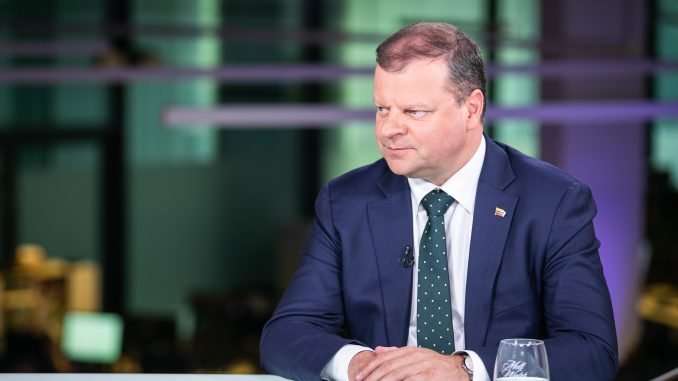
When asked about the reasoning behind his candidacy and his ideas for Lithuania’s future, the prime minister responded that he believes that he could do more as president than he can currently as prime minister.
S. Skvernelis was reticent in regard to his ideas and plans if he obtained the post, only stating that he will be organising an event presenting his official programme and plan with specific actions and schedule for them. As far as ideas go, the PM limited his comment to, “I have always worked for the motherland and I will continue in the future.”
In regard to what he could do as president that he cannot as prime minister, S. Skvernelis remarked regarding the situation where the president has refused to approve proposed candidates to minister of environment, something that he could then change. He also emphasises that currently much power and authority has been concentrated in the Presidential Palace despite parts of this being intended to be shared with the Seimas or cabinet. He expresses belief that competition between the branches of government, as it is now, is unhealthy and instead there should be cooperation.
Recently S. Skvernelis had his first campaign meeting with voters in Kėdainiai. The candidate notes that while he has gone through an election campaign already, there was still some nervousness to it. He noted that such meetings are crucial, stating, “Direct interaction with people helps, every person can touch the candidate, see them, chat, perhaps be rid of certain stereotypes, which perhaps form from certain episodes of public life.”
The prime minister has in recent times been criticised for his poor English language skills. At the same time, he has said that he will be speaking only Lithuanian in all international meetings. He explains that he never studied the language, instead his first foreign language being German. Nevertheless, he explains that he is taking classes in English.
Current surveys have revealed that the percentage of the Lithuanian public that views S. Skvernelis negatively has been rising, with currently 42% rating him negatively and around 35% rating him positively. In this respect, S. Skvernelis stated, “I believe that ratings are very important in any case. We can discuss, what the numbers are, what the sample size is, what audiences are interviewed. We saw various numbers prior to the Seimas elections as well, a variety of them. It is natural that the work of a prime minister is the sort where everyone sees opportunities to make use of the so-called administrative resource. But they do not see the other side.
It is criticism, daily work, it is also unfortunately mistakes, which are made. There are certain trends where, as I mentioned, there are efforts to present me as something I am not – some angry, stubborn, unable to control his emotions person, which is not me. Yes, I definitely uphold my word and naturally I dislike to be cheated and agreements to be breached.”
When queried if the agreement in question is regarding the situation with the minister of environment, where President Dalia Grybauskaitė could have not upheld her end of the agreement, S. Skvernelis stated he was only speaking in general. He follows up by emphasising his travels around Lithuania, how he sought to see beyond Vilnius and visited perhaps more than three quarters of the country’s municipalities. He stresses that he wishes to be evaluated based on his work as a politician, not the image that, as he states, has been fabricated for him.
Sociologist Vladas Gaidys has said that with a negative approval rating, it would be a miracle to win the elections. To this, S. Skvernelis responded that he does not believe in miracles, remarking that, “I believe in thorough, consistent and patient work, common sense and arguments. If we believe that we should trust promises regardless of whether they were ever accomplished or evaluate responsibilities held before in serving the state, people will make their decision. In either case, it will be the people’s choice and whatever it will be, I will respect it.”
When asked what the main arguments were to only declare his candidacy around the start of this year even though for many onlookers it was already clear for a good time before, S. Skvernelis responded that the past year had been difficult in seeking to make structural reforms and also approve the budget. He finds that there was a full effort directed against himself and his efforts, regarding which he questioned, what causes such fear of him. While the politician does not describe this as a conspiracy, he believes there is a united front against him, even while he does not proceed to specify, whom it contains.
S. Skvernelis remarks that he enjoys being challenged and efforts against him are a motivation. He notes that he could have easily sought a position less in the spotlight if he wished for comfort, but instead he wishes to be challenged, which leads to his current course.
“I understand well that in either case, whatever the results of the elections, whether I win or lose, there will be massive challenges in July in terms of both the majority’s future, formation and strengthening it as well as forming a cabinet,” the prime minister said.
